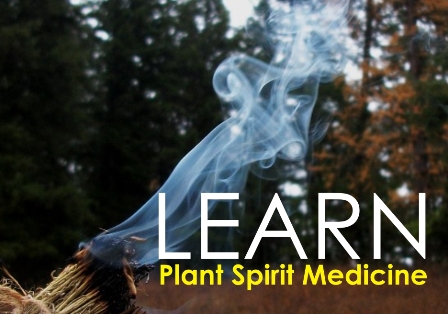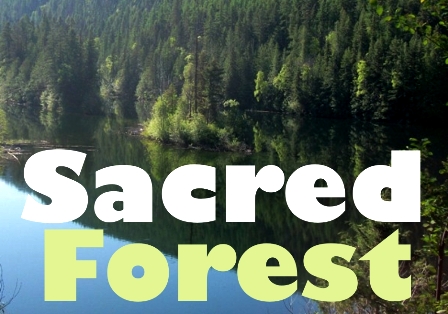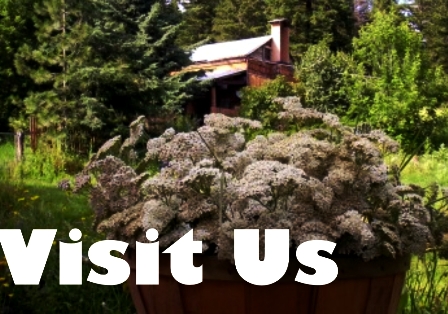Become a Master Wildcrafter
Wildcraft Forest School is the first educational center to offer a Wildcrafting Bioregional Studies Certificate(WBSC) and a Wildcraft Practitioners Diploma (WPD) for Master Wildcrafters. The school operates within a co-mentorship structure and connects students with ancient Shamanic teachings. The Wildcrafting Bioregional Studies Certificate is intended to strengthen Permaculture Design Courses and offers students an opportunity to learn and practice stewardship, restoration and harvesting in remote wildland areas. The following represents the course offerings presently avaiable for at Bioregional Studies Certificate(WBSC).
Contact
Here at the Wildcraft Forest there's always too many people to thank - and thank goodness for that! Please visit our website for updates and to learn about our special events or give us a call at 250.547.2001

e-tea

The Wildcraft Forest News and Events Page

contact the forest
250.547.9812

Yasei Shinrin Yoku
Teachers Training
Distance Learning Series & Camps
The Wildcraft Forest School approach to Shinrin Yoku incorporates wildcrafting, which includes a tangible understanding of the sentient forest. Participants are introduced to the many spirit guides that dwell in the forest. Through the use of forest-based teas and essential essences we will explore the subconscious energies that connect the forest with the most ancient part of our soul. Please register with us for this six-month teachers training program, which includes seven sections that are delivered through online components that are combined with outdoor fieldwork as well as guided interactions and challenges within the forest. During the course you will be assigned a Wild Skills Guide who will provide you with online and phone support in an effort to help you become strengthened as a Yasei Shinrin Yoku guide, and able to explore and practice the realm of Deep Forest Therapy.
Climate Change:
Rewilding Amidst a Changing Consciousness
Wildcraft Forest School to participate
in the 4th World Conference on Climate Change
North Okanagan, British Columbia - A different kind of message about climate change will be presented to a global scientific community this fall, and that message will be coming from a Canadian. Don Elzer the founder of the Wildcraft Forest School has been invited to speak at the “4th World Conference on Climate Change”, which is being held in Rome in October. The conference brings together leading scientists from around the world to discuss all aspects of climate and climatology. Climate Change 2017 anticipates more than 500 participants from around the globe and includes thought provoking presentations within the theme, “Today’s Progress and Tomorrow’s Climate Challenges”.
“I’m excited to be participating in the climate conversation with leading scientists”, said Elzer, who added, “By the time the conference happens in October, the world will be even more embroiled regarding the issue of climate change - as opposing views on the subject collide, and it now appears that we will be central within that discussion.”
Elzer will be presenting on the topic, “Wildcraft Forest School Field Studies: Regenerative Practices and Rewilding Amidst a Changing Consciousness”. From British Columbia’s Okanagan region, Elzer has developed a school with curriculum for adults, which teaches that plants, elements, and all living organisms are “sentient”, and have intention and capabilities far beyond what humans can imagine. The school considers itself “boots on the ground” and guides students as they carry out problem-solving innovation, tangible work and stewardship in an effort to regenerate ecosystems and their lives.
The school connects people with the spiritual and wellness factors found in nature and also incubates efforts that will transition economics towards small footprint Earth-friendly scenarios. Much of the work that the school does is covert and is not noticed by the public because it seeks to provide an immediate and streamlined response to problem solving in remote wild areas and within wild/agriculture interface areas. In this process, discoveries are made and trends are identified and then shared within scientific and advocacy communities.
The school delivers learning experiences in camps where participants are interactive within wild areas, however Elzer developed an online distance-learning program that is being delivered worldwide and is gaining in popularity exponentially.
“The scientific community from around the world have been taking notice for quite some time regarding our approach to nature and how to protect it, and this invitation represents a spike in that curiosity because we are engaging in a new form of stewardship that can be replicated everywhere and it is not linked to economic or social incentives - it is linked to the heart and to the human spirit”.
Elzer describes the work of the school as helping to create “Environmental Movement 2.0” which is about individuals repairing the planet and regenerating biodiversity as their life’s mission.
During his presentation Elzer will be outlining certain well-recognized problems. Climate change and certain industrial activities are impacting biodiversity in rural and remote areas. Wild species in “local” ecosystems are transitioning to different locations. A lack of capacity for monitoring leaves these issues and events un-noticed. Because of the vastness of this problem, governments and institutions are unable to deliver assistance. Most often, people connected to these remote landscapes are observing these changes, but they may not have the organizational capacity to problem-solve. Often these wild edge and riparian areas are within an industrialized farming, logging or plantation interface, which is also stressed. Shifts in supply and demand in the resource, food and medicine marketplaces are driving these industrial operations to expand even further into wildlands, placing habitat at risk; at the same time local “food security efforts” compete for these same lands.
“I will be sharing our narrative that links people with a “spiritual” connection to ecosystems that includes ethics and stewardship. This incentive framework creates meaning and purpose, which drives an individual commitment towards stewardship of a place. The applied fieldwork has helped to transition and support species impacted by climate change and negative industrial impacts as well as to create new regenerative models for the harvesting of wild foods and medicines”.
“There’s a great deal of work that needs to be done, we are just scratching the surface of what is possible, but opportunities continue to emerge for replicating this model so that it can be applied in other regions and to improve the partnerships with scientific and monitoring agencies. This conference presents an important threshold for creating those international partnerships – I think everyone recognizes that we need to engage more people to do the work that’s required to help this planet – and time is of the essence.”
Media: For more information about this event including an interview with Don Elzer contact the Wildcraft Forest at 250.547.9812
Or by email: mediaservices@uniserve.com
Quotes from Don Elzer
“We have situations where a in one part of the world, an introduced plant is being exterminated because it is considered an invasive; but yet in its natural habitat it is endangered. If this plant has no human purpose, it remains ignored and thus extinction may be imminent. However in reality, the plant is of great value in its natural ecosystem, and may have become valuable in its new ecosystem as well. This is a classical “management” scenario that lacks “stewardship””.
- Don Elzer
“There are approximately 1000 plant species commonly used in contemporary Chinese herbal preparations. More than three quarters of these are collected from the wild. The demand for medicinal plant material has grown at an annual rate of 9% for almost four decades. The threat posed by over exploitation, and the measures that need to be taken for the conservation and stewardship of medicinal plants has been recognized since the early 1990’s however little action has been taken and this has now moved from an ongoing problem to an environmental crises.”
- Don Elzer
“Between now and 2030 the population of the global middle class will triple in size which will place enormous pressure on food, medicine and cosmetic supply chains. Traditional growing areas largely within tropical and subtropical regions will have reached build-out, in other words there will no longer be enough suitable land to meet this growing demand. More intensive methods of growing will still require more water which will be in shortage and will involve greater use of herbicides and chemical fertilizers; however more than anything, these areas will be impacted by climate change. There will be additional regional competition for farmland as local and regional food shortages occur, making for political stress with industrial plantations.”
- Don Elzer
“Within the Wildcraft Forest School’s Yasei Shinrin-Yoku (Yasei) training program we incorporate wildcrafting, and this includes a tangible understanding of the "sentient forest". Yasei considers the expansion of our health, purpose and well-being as being directly related to the work that we do for the benefit of the forest - the practice considers that we and the forest are "one" and that through this presence the true natural balance of energy can be achieved that benefits the individual and the natural world. If we invest in the health and growth of the forest then the forest will invest in us - the medium of exchange is "life-force".”
- Don Elzer
Other speakers…
4th World Conference on Climate Change
October 19-21, 2017 in Rome, Italy.
Climate Change 2017 anticipates more than 500 participants from around the globe with thought provoking presentations within the theme, “Today’s Progress and Tomorrow’s Climate Challenges” including:
Dr. Bernard Foing has a PhD in Astrophysics and Space Techniques and is a French scientist at the European Space Agency (ESA). He is also the Executive Director for the International Lunar Exploration Working Group (ILEWG) which is global forum that addresses how countries “share” the Moon; and was Principal Project Scientist for SMART-1, the first European mission to the Moon. Foing is also an organic chemist for Mars Express, a space exploration mission by the European Space Agency. Launched on June 2, 2004, Mars Express is the first planetary mission attempted by the agency.
Dr. Vladimir Babeshko is a Russian physicist and the former President of Kuban State University in Krasnodar, Russia. He is one of the scientists who discovered the existence of high frequency resonance in semi-restricted media with inhomogeneities.
Professor Nils-Axel Morner of Stockholm University is retired but was the head of the Paleogeophysics and Geodynamics department from 1991 to 2005. Professor Morner is a prominent authority on sea levels and is known as an outspoken skeptic of global warming and sea level increases.
Professor Alexander Baklanov of the World Meteorological Organization in Switzerland which is an intergovernmental organization with a membership of 191 Member States and Territories. It originated from the International Meteorological Organization (IMO), which was founded in 1873. Established in 1950, WMO became the specialised agency of the United Nations for meteorology (weather and climate), operational hydrology and related geophysical sciences. An adjoint professor in integrated dynamic/chemical modeling at the Niels Bohr Institute of the University of Copenhagen. He is an expert on integrated modeling for meteorological and chemical weather prediction; Megacities, air quality and climate interaction. He has 30 years of experience in developing and using numerical atmospheric dynamics and pollution models at different scales: from local- and meso- to regional and global scales.
For more details about Climate Change 2017 visit
PRESS KIT

Wildcrafter Don Elzer the founder of the Wildcraft Forest School has been invited to speak at the “4th World Conference on Climate Change”, which is being held in Rome in October.
Don Elzer teaches barefoot and in remote wilderness areas. The Wildcraft Forest School delivers learning experiences described as being driven by heart and spirit and is creating “Environmental Movement 2.0” which is about individuals repairing the planet and regenerating biodiversity as their life’s mission.







